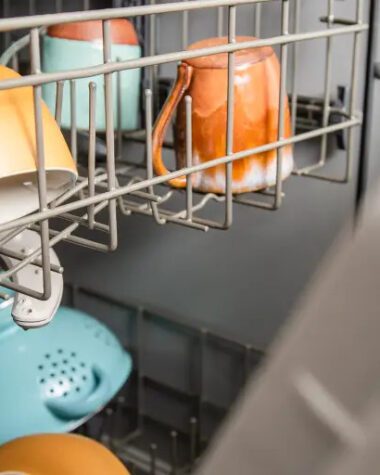Water is water; simple as that. After all, the water we use to clean, bathe, and drink cannot be that different from that of our neighbors. Guess what? There is a slight difference in the water we are using, but we never had the time to look into it.
That’s where we come in because, in this post, we’ll be exploring various types of water, how they differ from one another, and what impact they have on your dishwasher.
What is Hard Water?
Hard water is an accumulation of minerals such as magnesium and calcium. These minerals exist naturally depending on the geographical location and water source.
According to National Water-Quality Assessment (NAWQA) research, there are about 2,100 residential wells in the United States where water hardness has been detected as 1 water-quality measure due to the observation of man-made and inorganic chemicals.
Fortunately, it is simple to determine whether or not you have hard water in your house. Simply look for the following indicators:
- Spots or film accumulating from your glassware and utensils
- Unpleasant taste
- Surface stains
- Clothes and fabrics wearing out
- Low water pressure
- Difficulty with washing soaps
If you’re uncertain about the signs of hard water in your home, a hard water test kit will give you a solid answer. You can find these kits at most home improvement stores.
If you still need to determine whether your house has hard water, a hard water test kit will provide the answers you need.
Are there any Health Hazards Related to Hard Water?
Although it contains magnesium and calcium, essential to the human diet, hard water isn’t extremely harmful. But too much exposure can cause skin irritation and hair damage, resulting in hair loss.
What are the Most Common Dishwasher Problems Caused by Hard Water?
1. Dishes with Water Spots
You run the dishwasher, but there are still streaks of a chalky white color on your dishes. This is an obvious sign of hard water. These water spots are most visible on clear drinking glasses but can spread to regular dishes and feel chalky when touched.
2. Chalky Residue in Your Dishwasher
If your dishwasher becomes clogged with limescale, you have a big problem with your hands. A dishwasher that can’t keep itself clean won’t be able to keep your dishes clean either.
In addition, unattended limescale build-up can result in severe blockage problems.
3. Dishes Aren’t Getting Clean
If there are any leftover food scraps from your dishes after a cycle, you know you have a problem. While this isn’t a direct source of hard water, limescale accumulating on your dishwasher, blocking it over time, is the main culprit.
4. Rust Forming on Your Dishes
When exposed to water with mineral build-ups such as salt, it can cause rust and corrosion on your dishwasher and its parts.
How to Handle Hard Water Problems
1. Water Softening
Today’s dishwashers come with a pre-installed water softener, but if yours doesn’t, you can add one. A water softener reduces the number of minerals in your water, resulting in soft water for the entire household.
2. Make Use of More Detergent
Consider using additional detergent in your dishwasher if you want a less expensive approach. Make sure to check the instructions manual to learn the recommended detergent quantity.
Tip: Consider excellent detergent pods formulated to deal with hard water on the market.
Related Article: Dishwasher Pods: 7 Cleaners for Crystal Clear Dishes
3. Adding Rinse Aid
The filming streaks on your dinnerware may be removed with a rinse aid. Again, check the instructions manual to ensure the right amount of cleaning solution to apply.
4. Running Dishwasher with Vinegar
If you want an alternate option that does not cost anything. You may run a cycle on your dishwasher after adding a cup of vinegar. Vinegar is excellent for cleaning tough stains from your dishwasher.
What is Soft Water?
In contrast to hard water, which has a high concentration of minerals, soft water is free of potentially harmful minerals that might harm you or your family. It has less calcium and magnesium, which can be removed using a water-softening system.
Are there any Health Hazards Related to Hard Water?
Although soft water poses no danger, it may contain salt concentrations potentially harmful to adults with a history of high blood pressure.
What are the Most Common Dishwasher Problems Caused by Soft Water?
Contrary to hard water, soft water isn’t harmful but has drawbacks that might damage your household. Some of the disadvantages include the following:
- Pipe corrosion
- Environmental implications from high sodium levels
- Possible health risk
Softer water, on the other hand, has few advantages that your dishwasher may benefit from:
- Soft water leaves no mineral stains on your dishes or the dishwasher, reducing wear and tear.
- It eliminates soap film from your dishwasher
- Prolongs your dishwasher’s lifespan.
Bottomline
In the battle between hard and soft water, soft water is the clear winner for your dishwasher. It’s healthy for your equipment, dishes, and wallet because you could save up to 30% on energy costs. We hope that by doing so, we can offer you the necessary information on what sort of water is ideal for your dishwasher and your household.
While hard water is unavoidable depending on where you live, you can always employ water filtration devices or, better yet, invest in a quality dishwasher with water softening.
To learn everything there is to know about everyone’s favorite kitchen partner-in-crime, click here to read the definitive dishwasher guide.









